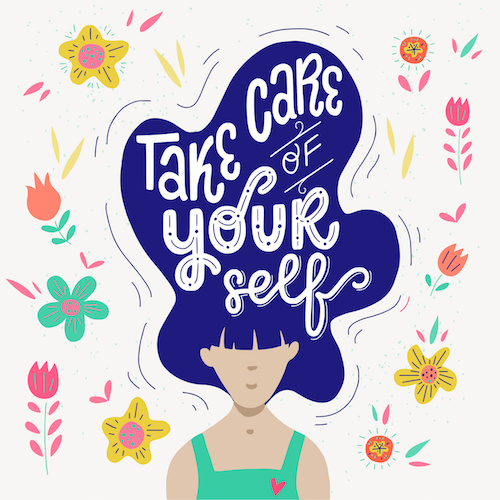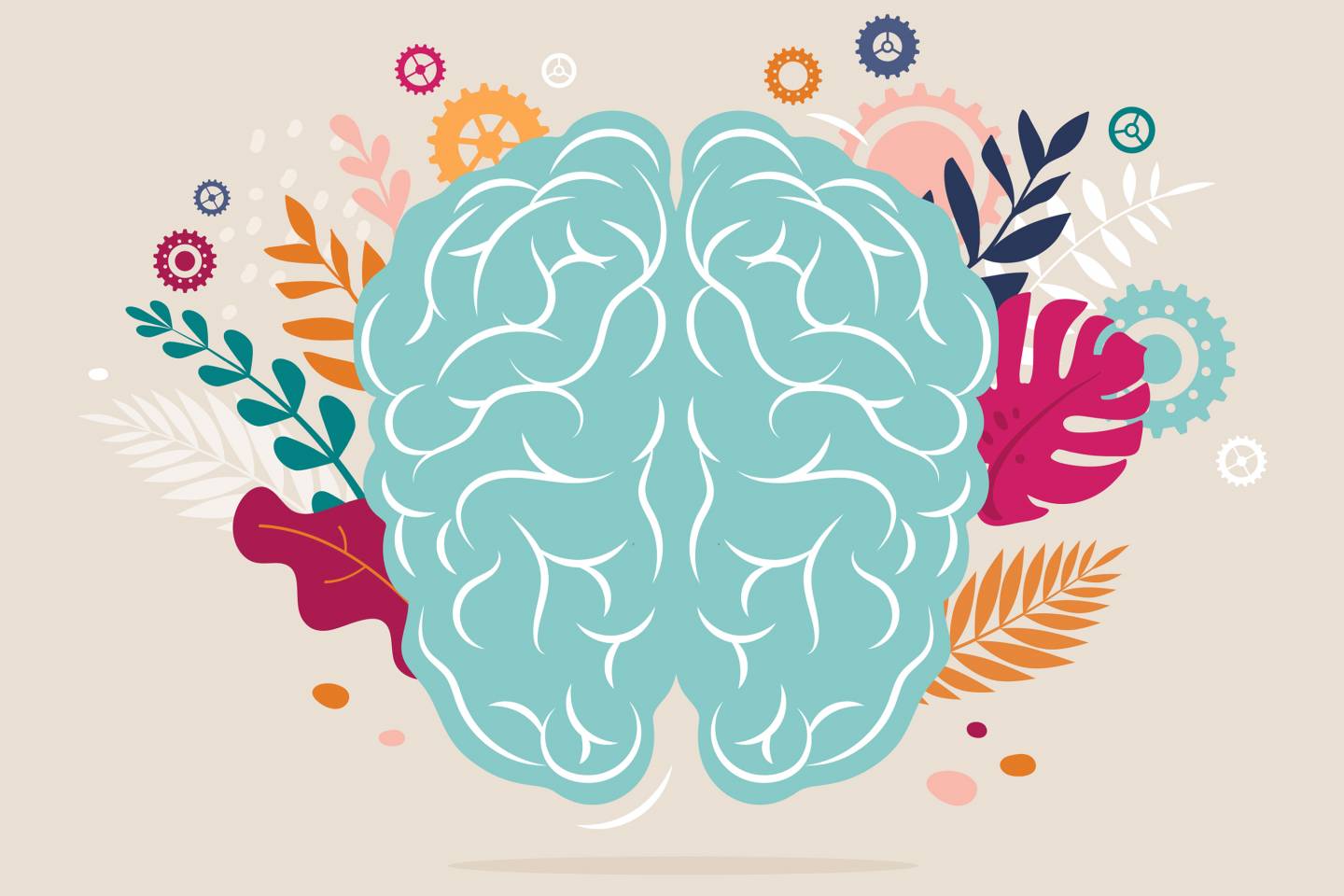PERSONAL SIDE NOTE ON MENTAL HEALTH: I believe that thriving mental health is very key to all your success at Olaf. It is therefore important that you take care of your mental health. Do what you need to do, in order to be in the correct headspace for learning. Such things may be exercise, meditation, some alone time (Natural Lands are an excellent option), keeping in touch with your family, etc. Recognize and use your support structures.
St. Olaf is a wonderful place and students are oftentimes very active and busy. This, however, can lead to feeling overwhelmed, stressed, and burned out, especially in the time of the pandemic. Mental Health is very important not only to your success but to your well being. Let’s talk a bit about mental health, types of struggles that might occur, and some important resources on campus that deal with mental health that can help you with your struggles.
What is Mental Health?
Mental health is defined as a state of well-being in which every individual realizes their own potential, can cope with the normal stresses of life, can work productively and fruitfully, and is able to make a contribution to their community. It is commonly related to a person’s condition with regard to their psychological and emotional well-being.
Mental Health at St. Olaf
Mental Health challenges are common among students on the Hill. Mental Health can be affected by many factors, such as challenges in life, challenges with other students, stress related to issues back home, or an upcoming exam. Stress, Anxiety, Depression, Eating Disorders, and Sleep Deprivation are common mental health disorders and the frequent disorders that college students struggle with. Depression and Anxiety are very common on our campus, and if you are struggling with mental health on any scale – it’s okay, don’t hesitate to ask for help.
What is Stress?
Stress is a state of mental or emotional strain or tension resulting from adverse or demanding circumstances. In college, some say that stress is contagious because even the calmest students can get stressed when they see their peers stressed. However, if a person knows themself well, then they could simply reverse the causes of the stress by actions called “De-stress”.
- Get enough sleep. Inadequate or poor-quality sleep can negatively affect your mood, mental alertness, energy level, and physical health.
- Learn relaxation techniques. Meditation, Self-reflection, progressive muscle relaxation, guided imagery, deep breathing exercises, and yoga are powerful stress-busters. Youtube has many guided meditation videos that can help one focus on relaxation, destressing, and falling asleep. One channel that I recommend is the Honest Guys
- Strengthen your social network. Connect with others by taking a class, joining an organization, or participating in a support group. Or simply take me-time. Be sure not to overload yourself with social activities though, as too many can lead to stress and not enough sleep. Instead, find about 1-3 extracurricular activities to participate in.
- Hone your time-management skills. The more efficiently you can juggle work and personal needs, the lower your stress level.
- Try to resolve stressful situations if you can. Don’t let stressful situations fester. Take a break from everything, and think about how the problem/issue/stressful situation could be solved. If you can’t, have some tea with a friend, counselor, advisor, …etc.
- Nurture yourself. Treat yourself with something you enjoy doing. Truly savor an experience: for example, eat slowly and really focus on the taste and sensations of each bite. Take a walk or a nap, or listen to your favorite music using the Library’s headphones. Again, remember – me-time. Don’t forget, that self care is not always spa masks and Netflix, but sometimes it is cleaning/organizing your room, taking your medicine, or forcing yourself to take a shower.
- Ask for help. Don’t be afraid to ask for help from your friends, advisors, professors, counselors, Wellness Center, and/or Boe House if stress and anxiety persist, talk to your doctor.
- Again please reach out for help. There are support structures put in place for you. Your ISCs will always be there for you if you need to talk to someone. Please reach out.
Anxiety
Anxiety is a feeling of worry, nervousness, or unease, typically about an imminent event or something with an uncertain outcome. Examples that could cause anxiety are, but not limited to, how well you did on a test, how did your job interview go, your first time performing on stage, your important soccer game tomorrow…, etc.
There are several ways that one could tackle anxiety before it happens or during its occurrence:
- Exercise. Physical activity helps your body and mind. Go to the gym. Take a jog. Go for a walk. Do yoga. Play Frisbee. Just get moving!
- Eat a balanced diet. Don’t skip meals. Try to eat from all of the food groups. Try to minimize soda and coffee because caffeine can trigger anxiety and panic attacks.
- Get involved. Being active in the community creates a support network and gives you a break from your everyday stress.
- Do your BEST instead of trying to be PERFECT. We all know perfection isn’t possible, so be proud of however close you get. Although I am sure we would all love to get an A or a B, remember, a C paper is better than a zero in the grade book.
- Take a timeout. Take a deep breath and count to 10. Stepping back from a problem lets you clear your head. Do yoga. Meditate. Get a massage. Learn relaxation techniques. Listen to music. Do some me-time.
- Put things in perspective. Think about your situation. Ask yourself whether it’s really as bad as you think it is or if you could be blowing it out of proportion. Sit outside for a couple of minutes, breathe, and think of the situation(s) and how they could be solved. Try journaling about your feelings and why you feel that way, work on reframing some of your worries.
- Talk to someone. Don’t bottle up emotions to the verge of explosion. Reach out to your roommate, significant other, counselor…,etc. if you’re feeling low.
- Find out what triggers your anxiety. Take notes or write in a journal when you’re feeling anxious or stressed, and then look for patterns.
What is Depression?
In the psychiatric sense, depression is a mental condition characterized by feelings of severe despondency (a state of low spirits caused by loss of hope or courage) and dejection (a sad and depressed state; low spirits), typically also with feelings of inadequacy and guilt, often accompanied by lack of energy and disturbance of appetite and sleep.
But what are the symptoms of depression?
|
Feelings:
|
Thoughts:
|
Behaviors:
|
Physical problems:
|
The treatments of depression are various and they range from chatting with a close friend or a counselor to going to the various resources on campus (Wellness Center, Counselling Center, College Ministry…, etc, visit St. Olaf Website for resources related to mental health.
Eating Disorders
Eating disorders manifest themselves in many ways and affect people regardless of gender, size, sexuality, race, socio-economic status, or religion. The two most well known eating disorders are Anorexia Nervosa and Bulimia Nervosa. Beyond these two though, are Other Specified Eating Disorder and Orthorexia.
Anorexia Nervosa
According to the National Institute of Eating Disorders, Anorexia “is an eating disorder characterized by weight loss (or lack of appropriate weight gain in growing children); difficulties maintaining an appropriate body weight for height, age, and stature; and, in many individuals, distorted body image. People with anorexia generally restrict the number of calories and the types of food they eat. Some people with the disorder also exercise compulsively, purge via vomiting and laxatives, and/or binge eat”.
Bulimia
Bulimia Nervosa is described as the following by the National Institute of Eating Disorders: “Bulimia nervosa is a serious, potentially life-threatening eating disorder characterized by a cycle of bingeing and compensatory behaviors such as self-induced vomiting designed to undo or compensate for the effects of binge eating.”
Other Specified Eating Disorders
The National Institute of Eating Disorders explains that Other Specified Eating Disorders is a diagnosis used for those who struggle with an eating disorder, but whose symptoms do not fit strictly into the diagnosis of Anorexia or Bulimia. This “catch all” term in no way takes away from the seriousness and life-threatening effects this illness can have on people.
Orthorexia
Although this diagnosis isn’t officially recognized by the DSM, this term has become increasingly popular to describe someone who is unhealthily obsessed with eating only “healthy” foods. According to the National Institute of Eating Disorders, “ [a]lthough being aware of and concerned with the nutritional quality of the food you eat isn’t a problem in and of itself, people with orthorexia become so fixated on so-called ‘healthy eating’ that they actually damage their own well-being”.
Symptoms of an Eating Disorder
- Obsessively checking one’s weight and/or obsessively measuring parts of one’s body (ex. Measuring one’s waist)
- Excessive exercise
- Poor body image
- Going to the bathroom immediately after every meal
- Taking laxatives or diuretics daily when not instructed to by medical professional
- Suddenly becoming obsessed with the amount of calories, carbohydrates, sugars, etc. in food
- Secretive eating
- Purposefully not eating for several hours or more
- Purposefully not eating for several hours or more and then eating more than a normal portion size
Eating disorders are serious illnesses and should be treated as such. If you notice some of these symptoms in yourself or a loved one, you should consult a doctor, an advisor, or someone at Boe House. If you are not quite sure how to reach out to someone, you can always contact your counselor, and they can help you get in contact with medical professionals.
Sleep Deprivation:
Sleep deprivation is the condition of not having enough sleep; it can be either chronic or acute. A chronic sleep-restricted state can cause fatigue, daytime sleepiness, clumsiness and weight loss or weight gain. It adversely affects the brain and cognitive function.
At St. Olaf during winter times, the sun will set at around 4:30pm, which means much less daylight than many other places where most students come from. This lack of sunlight makes us more likely to develop Seasonal Affective Disorder (SAD). Symptoms of SAD can be extreme: mood swings, anxiety, sleep problems, or even suicidal thoughts. However, with at least 30-minutes of exercise a day and compensation of Vitamin D via sources such as drinkable Fish-Oil, will help you cope with the lack of sunlight during winter times. The library also has “Happy Lights” which you can check out for 2 hours, these lights mimic that of the sun (without the UV radiation) and have been suggested by sleep doctors to those struggling with sleep issues and SAD.
When to take action:

Mental health is often regarded as an approach to treat and solve existing issues. It is important to remember that mental health and care do not only start when problems occur. You don’t have to wait until you are burnt out to take action. Preventive methods and healthy lifestyles allow for the improvement of the quality of life and experience here on the hill. In addition, a healthy lifestyle can optimize your potential and allow you to reach your goals as you grow and develop at St. Olaf.
A lifestyle that incorporates mental care into its daily routine, helps you avoid developing mental illnesses as well as allows you to enjoy your college experience. Meditation, exercise, and enough sleep, etc.. are known to help prevent individuals from crashing and developing mental illnesses.
Resources on campus
St. Olaf has several important resources in case you find yourself overwhelmed, stressed, or need someone to talk to. They can be confidential and non-confidential.
Confidential Resources are the ones that are not required to disclose any information of the student unless their life is in danger or there have been cases of abuse.
Non-Confidential Resources are the ones who can disclose the information if they deem it necessary, for your own well-being and safety.
Below, the resources are listed, with a short explanation of what you can get out of it.
Peer Educators at the Wellness Center:
The Wellness Center serves as a resource to promote awareness and education on issues relating to healthy lifestyles. They provide prevention and intervention services for alcohol and other drug use and abuse concerns.
Peer Educators (PE) who staff The Wellness Center are available to talk with students one-on-one during office hours. Students are encouraged to come in and talk with a PE on any health-related issue. Peer Educators are current students who provide approximately 10 programs per month on topics such as chemical health, nutrition, relationships, sexual health, and mental health.
The Peer Educators are St.Olaf students that the institution has trained to be qualified to help students with various mental, physical, social concerns that the students have. They also offer chocolates, drinks, munchies during their office hours for students to come and get a snack if they need to.
The Counseling Center:
The Counseling Center was established by St. Olaf College to enhance the personal growth and development of its students. It supports students in their academic pursuits and facilitates personal and interpersonal learning and growth. Their programs are preventive as well as remedial. The Counseling Center offers a variety of services and programs, including individual counseling, group counseling, workshops, testing, consultation, and referrals. Services are provided without cost to all currently enrolled St. Olaf students, and they follow the ethical and confidentiality guidelines of the Minnesota Board of Psychology.
But isn’t Counseling for crazy people?
No. In the United States, it is very common for anyone to go to counseling — whether it is just one time to get advice on a single issue, or if you need regular visits for more long-term care. Don’t ever be afraid to ask for help.
The Deans:
A Dean is defined as a senior member of a college, with disciplinary and advisory functions. At St.Olaf the deans have interesting backgrounds and they love talking to students and hearing about their good times and how they can make sure that their experience at St.Olaf can be maximized and enjoyed to the fullest extent. They are also open for conversation since they see every student as an individual with an interesting background and story.
The office role of the dean is to serve as consultants to individual students and student groups about student issues and concerns, including personal and academic matters. Questions or concerns about policies, procedures, or problems are encouraged. If you need assistance in resolving a college issue or are unsure about where you can go to get assistance, the Dean of Students’ Office is a good starting place.
Taylor Center for Equity and Inclusion:
In this space, students from various backgrounds, be it based on race, nationality, sexual orientation, background, culture, …etc. sit together and enjoy conversations because the space offered is welcoming to initiate friendships based on various ideologies. In addition, this Center is where all the administrative information given to the International Student Counselors is located, which means that counselors might spend some time there, but not necessarily always. Furthermore, the Center aims to provide resources and support for the community to engage, educate, and enrich campus life for all students.
Mobile Crisis Team:
Sometimes an individual could have an extreme breakdown situation where one cannot find an immediate solution. The Mobile Crisis Team is a service provided in Northfield to intervene in the situation immediately by calling 1-877-399-3040. It consists of two staff members who are available from 12 midnight to 8 a.m. (0:00 to 08:00) to respond to mental health crises in the community. They are short-term face-to-face mental health services to help individuals to cope with stress, use resources, avoid hospitalization, and develop action plans.
TimelyCare
Timelycare is a new telehealth service that the college is implementing to help supplement the Counseling Center. Below is some information about its services in policies, according to Hassel Morisson, the Vice President for Student Life.
“Current St. Olaf students will have access to the following services via the TimelyCare app:
- Medical Care (24/7, on-demand, and scheduled access to licensed medical providers who can treat a wide range of common illnesses like cold and flu, sinus infection, allergies, and more)
- Mental Health Care
- TalkNow (24/7 on-demand access to a mental health professional to talk about anything at any time)
- Scheduled Counseling (access to a variety of licensed counselors, you choose the time and date to meet, 12 visits per academic year)
- Health Coaching (access to nutritional specialists and health coaches)
- Psychiatric Care (referral from Boe House Counseling required to utilize this service)
Accessing TimelyCare
To begin utilizing these services, log in to the TimelyCare app. You will need to use your St. Olaf Preferred First Name (without any accents, umlauts, or other diacritics), Last Name, Date of Birth, and St. Olaf Email Address to login. For more information about how to log in and utilize the service offered by TimelyCare, check out this website.
You are not alone
It’s easy to get carried away with the busy lifestyle of an Ole, but if you ever feel overwhelmed, stressed, or need help with anything, don’t hesitate to ask for help! It can be hard to ask, but know that we are here for you and are more than willing to help, as we were helped when we needed it! If you have any questions about mental health, feel free to ask any of the International Student Counselors.

(c) All the pictures belong to their owners.

